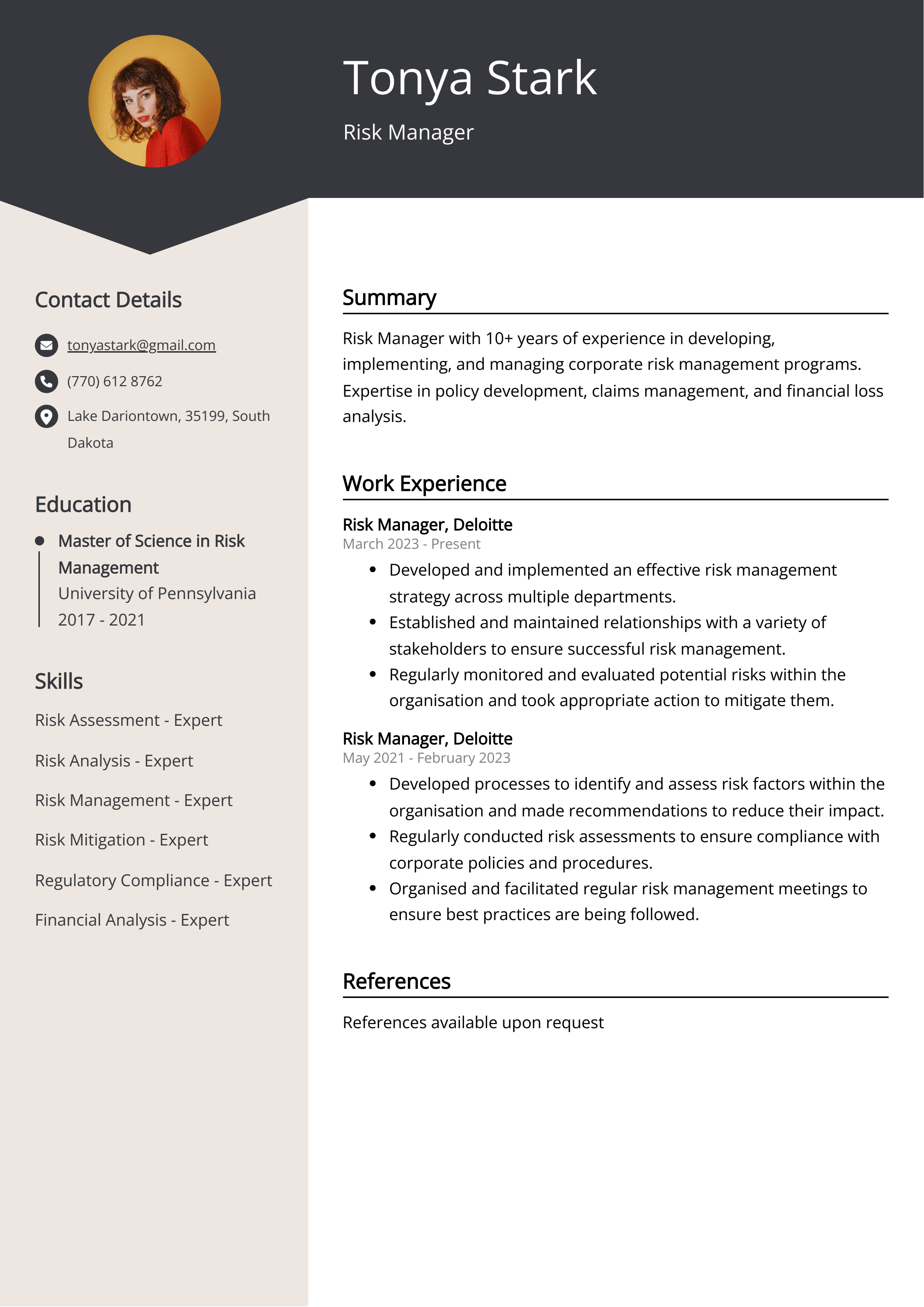

![]()
![]()
![]()
![]()
![]()

Are you looking to take your career in risk management to the next level? Our Risk Manager Resume Example will provide you with the necessary guidance and resources to craft a winning resume. This article will provide an overview of what is needed to create an effective resume for a Risk Manager, including which keywords and skills should be included, and how to format your resume. Follow along and you'll be well on your way to landing your dream job.
A Risk Manager is responsible for identifying, evaluating, and mitigating risks within an organization. They create and implement strategies to help anticipate, minimize, and manage potential losses resulting from certain events. This includes analyzing operations and activities, developing compliance plans, monitoring contractual agreements, and maintaining up-to-date knowledge of relevant laws and regulations.
Risk Manager
Personal Details:
Name: John Smith
Phone: 123-456-7890
Email: johnsmith@example.com
Location: Los Angeles, CA
Summary
John Smith is a highly experienced Risk Manager with over 10 years of experience managing corporate risk. He has a proven track record in identifying, assessing, and controlling risks to minimize their impact to the organization. He is proficient in the use of risk management tools and techniques, and is certified in Risk Management and Project Management. John is also fluent in English and Spanish.
Work Experience
Education
Bachelor of Science in Business Administration, University of California (2005-2009)
Skills
Certifications
Risk Management Certification (2009)
Project Management Certification (2008)
Languages
English, Spanish
Creating a perfect, career-launching resume is no easy task. Following general writing rules can help, but it is also smart to get advice tailored to your specific job search. When you’re new to the employment world, you need Risk Manager resume tips.
We collected the best tips from seasoned Risk Manager - Check out their advice to not only make your writing process easier but also increase your chances of creating a resume that piques the interest of prospective employers.
A risk manager resume summary or resume objective is an important part of your resume because it provides employers with a brief overview of your skills and accomplishments. It is also used to highlight your experience and qualifications that are relevant to the job you are applying for. The summary or objective will help employers quickly identify your relevant qualifications and skills, enabling them to make a decision about whether or not to contact you for an interview. Additionally, if you have not had a lot of professional experience, a resume summary or objective can help you stand out from the rest of the applicants and show potential employers that you are qualified for the position.
Building a strong experience section for a risk manager resume is important for a few reasons. First, it provides potential employers with a clear understanding of your qualifications and experience in the field. Second, it demonstrates that you are familiar with the concepts and techniques used in the risk management discipline. Finally, it is a great way to highlight the knowledge and skills you have gained while working in the risk management field. This will help to make your resume stand out from the competition when applying for a risk manager position.
A Risk Manager typically needs a bachelor's degree in a related field, such as finance, accounting, economics, business administration, or statistics. Many positions also require a master's degree in a related field. Professional certifications, such as the Certified Risk Manager (CRM) designation, can also be beneficial for a Risk Manager. In addition to formal education, Risk Managers need to have strong analytical, problem solving, communication, and decision-making skills.
Here is an example of an experience listing suitable for a Risk Manager resume:
Adding skills to a Risk Manager resume is important because it helps to demonstrate the individual's qualifications, experience, and expertise. It also gives potential employers an idea of the different areas of risk management that the individual is knowledgeable in. Additionally, listing skills on a resume allows employers to quickly identify which individuals have the qualifications and experience that match their needs. Examples of skills to consider adding to a Risk Manager resume include: risk assessment, risk management strategy development, compliance and regulatory adherence, data analysis, communication, project management, and technology.
In this competitive job market, employers receive an average of 180 applications for each open position. To process these resumes, companies often rely on automated applicant tracking systems, which can sift through resumes and eliminate the least qualified applicants. If your resume is among the few that make it past these bots, it must still impress the recruiter or hiring manager. With so many applications coming in, recruiters typically give each resume only 5 seconds of their attention before deciding whether to discard it. Considering this, it's best to avoid including any distracting information on your application that could cause it to be thrown away. To help make sure your resume stands out, review the list below of what you should not include on your job application.
It's time to begin the job search. Make sure you put your best foot forward and land your next postal service job with the help of Resumaker.ai.